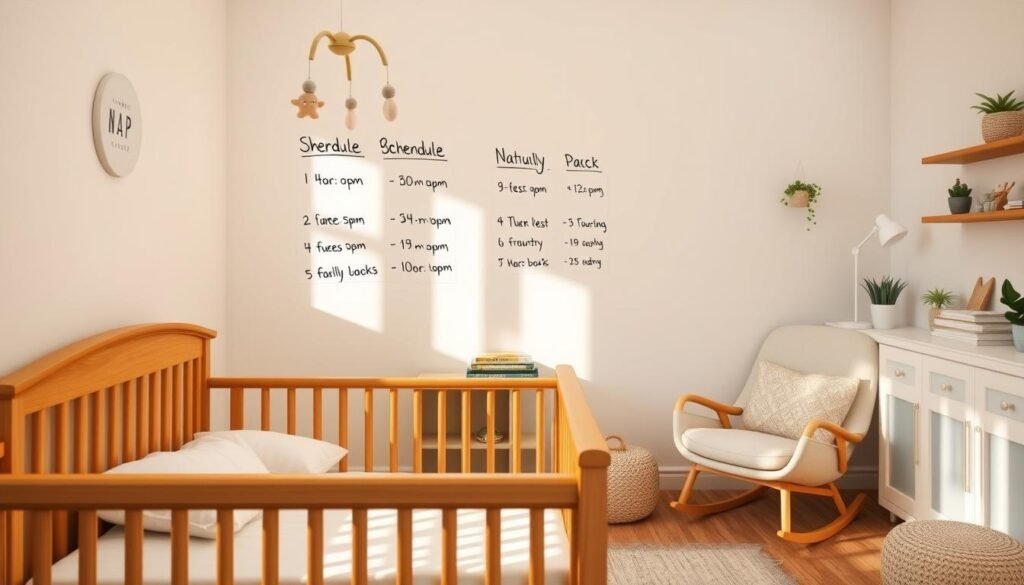As a parent, I know how vital a sleep schedule is for my 9-month-old baby. They need about 14 hours of sleep, with 11-12 hours at night and 2-3 hours during the day. It’s key to create a bedtime and nap schedule that fits their needs.
Research shows that a 9-month-old should sleep around 13-15 hours in a day. This includes 10-12 hours at night and 2.5-3.5 hours during the day. Knowing these numbers helps me make a sleep schedule that suits my baby’s unique needs.
Setting a consistent bedtime routine is crucial. It helps create a calm environment for my baby. Being flexible and adjusting the schedule as needed is also important. This ensures my baby gets the rest they need.
Understanding Your 9 Month Old’s Sleep Needs
As a parent, knowing about sleep training for infants is key for their growth. At 9 months, babies need 14 hours of sleep in a day. This includes both night and day naps. To help them sleep well, create a cozy sleep space and follow a regular sleep schedule.
A 9-month-old baby usually takes two naps, each lasting one to two hours. At night, they sleep for 11-12 hours. Remember, sleep regressions can happen between 8 and 10 months. This is when babies are learning new skills.
Total Sleep Requirements in 24 Hours
Here’s what a 9-month-old baby needs for sleep:
- 14 hours of sleep in a 24-hour period
- 11-12 hours of nighttime sleep
- 2-3 hours of daytime sleep, divided into two naps
Signs of Sleep Readiness at Nine Months
Look out for these signs that your 9-month-old baby is ready for sleep:
- Yawning
- Rubbing their eyes
- Becoming less active
Sleep Pattern Changes at This Age
At 9 months, babies may start to change their sleep patterns. They might:
- Go from three naps to two a day
- Sleep more at night
- Sleep less during the day
| Age | Total Sleep | Nighttime Sleep | Daytime Sleep |
|---|---|---|---|
| 9 months | 14 hours | 11-12 hours | 2-3 hours |
The Ideal 9 Month Old Sleep Schedule
As a parent, setting a consistent sleep schedule for your 9-month-old baby is key. It helps promote healthy sleep habits. A good nap schedule for 9 month old babies ensures they get enough rest for growth.
A 9-month-old baby usually takes two naps a day. They aim for 2.5-3.5 hours of daytime sleep. Morning wake times are shorter, from 2.5-3 hours. Afternoon wake times can be 3-3.5 hours. It’s important to adjust the schedule to fit your baby’s needs.
Some important things to consider for a 9-month-old baby’s sleep schedule include:
- Wake windows: 2.5-3.5 hours
- Morning nap: 1-2 hours
- Afternoon nap: 1-2 hours
- Bedtime: 7:00-8:00 pm
- Total nighttime sleep: 10-12 hours
By setting a consistent sleep schedule and promoting healthy sleep habits, you help your 9-month-old baby develop good sleep habits. Be flexible and adjust as needed to meet your baby’s unique needs.
Morning Wake Windows and First Nap Timing
Knowing the best time for a baby to wake up and nap is key for a good sleep routine. For 9-month-old babies, they usually wake up after 2.5 to 3.5 hours. This helps in setting up baby sleep patterns, infant sleep routines, and sleep training for infants.
It’s important to watch for signs that a 9-month-old is ready to sleep. This helps prevent them from getting too tired. Checking for sleep cues at the end of their wake window is crucial.
Optimal Wake-Up Time
The best wake-up time for a 9-month-old baby affects their baby sleep patterns all day. It’s good to aim for a wake-up time that balances wake and sleep well.
First Nap Duration
The first nap for a 9-month-old should not last more than 2 hours. This ensures they get enough time to be awake and eat well. It’s a big part of infant sleep routines and helps with sleep training for infants.
Managing Early Rising
To handle early rising in 9-month-old babies, a consistent morning routine is needed. This helps regulate their sleep patterns and improves sleep quality. It’s vital for sleep training for infants.
Afternoon Sleep Patterns and Scheduling
Getting a 9-month-old baby to sleep well is key for their growth. It’s important to have a regular nap schedule. The second nap of the day is in the afternoon. How long and when it happens can really affect the baby’s sleep quality.
A 9-month-old baby needs 2.5 to 3.5 hours of daytime sleep. This is split into two naps. Keeping naps short, at 2 hours or less, helps the baby stay awake enough to sleep well later.
Here are some tips for a consistent afternoon routine:
- Watch for sleepy cues, such as yawning or rubbing their eyes
- Put the baby down for a nap at the same time every day
- Ensure the sleep environment is dark, quiet, and at a comfortable temperature
By following these tips, parents can help their baby sleep better. This is important for their growth and development.
| Age | Average Total Sleep |
|---|---|
| 9 months | 14 hours |
| 10 months | 13.5 hours |
| 11 months | 13.5 hours |
Creating the Perfect Bedtime Routine
Creating a bedtime routine is key for healthy sleep in infants. As a parent, making a calming and consistent routine is vital. It helps your baby learn to sleep alone, which is important for their growth.
A good bedtime routine includes a warm bath, a bedtime story, and quiet time. These activities help your baby relax and get ready for sleep. Make sure your routine is consistent and allows enough sleep time. For a 9-month-old, bedtime should be between 7:00 PM and 8:00 PM, with 13 to 15 hours of sleep in 24 hours.
Essential Routine Components
Some key parts of a bedtime routine are:
- Nutrition: Feeding before bed can make sleep last longer until the next feeding.
- Hygiene: A warm bath is soothing, but bathe your baby no more than three times a week to avoid dry skin.
- Communication: Quiet activities like reading or singing help with language and thinking skills.
- Physical contact: Infant massage or cuddling makes your baby feel safe and calm.
Environment Optimization Tips
To improve your baby’s sleep space, make it dark, quiet, and comfortable. This helps your baby sleep better and promotes healthy sleep habits. By having a consistent bedtime routine and a good sleep environment, you help your baby sleep well for life.
Common Sleep Challenges at Nine Months
As a parent, knowing about sleep challenges at nine months is key. Sleep training for infants is vital to set a sleep routine. At this age, babies need 2.5 to 3.5 hours of sleep, with shorter morning wake times.
Some common sleep issues include:
- Nighttime wakings: Babies often wake up more due to growth.
- Sleep regressions: These can last weeks and happen with big milestones.
- Nap refusals: Babies might not want to nap or fall asleep easily because of baby sleep patterns changes.
To tackle these issues, focus on infant sleep routines. A consistent bedtime and wake-up time are crucial. A soothing pre-sleep routine, like a warm bath or reading, signals sleep time. Understanding and tackling these sleep challenges helps your baby sleep better.

Sleep Training Methods for Your Growing Baby
As a parent, it’s key to set up a regular sleep routine for your 9-month-old baby. Sleep training for infants can be tough, but the right steps can help your baby sleep well. Start by establishing a bedtime routine that tells your baby it’s time to sleep.
To optimize baby sleep, make sure their sleep area is good for sleep and keep a regular schedule. Here are some sleep training methods to try:
- Gentle sleep training approaches, such as the wake-and-sleep method or the “Pick-Up, Put Down” method
- Gradually increasing intervals for check-ins, as advocated by the Ferber Method
- Creating a structured three-step bedtime routine to help your baby fall asleep faster and sleep longer
Every baby is different, and what works for one might not work for another. Be patient and ready to change your approach if needed. With time and consistency, your baby can learn healthy sleep habits that last a lifetime.
Handling the Nine Month Sleep Regression
At 9 months, babies often face a sleep regression. This can be tough for parents. It’s marked by disrupted baby sleep patterns and can stem from developmental milestones and separation anxiety.
To tackle this, parents can set up infant sleep routines that foster good sleep habits. This includes a steady bedtime routine, regular naps, and a sleep-friendly room.
Some ways to promote healthy sleep habits include:
- Setting a consistent sleep schedule
- Creating a sleep-friendly environment
- Avoiding overstimulation before bedtime
Parents can also use white noise to aid their baby’s sleep. Keeping the room at 68-72 degrees Fahrenheit is also helpful. These steps can help babies get through the 9-month sleep regression and develop good sleep habits.
Remember, every baby is unique. What works for one might not work for another. Being patient and flexible helps parents find the best way to help their baby sleep well and establish a healthy sleep routine.
| Age | Average Sleep Needed | Typical Nighttime Sleep | Typical Daytime Sleep |
|---|---|---|---|
| 9 months | 14 hours | 11-12 hours | 2-3 hours |
Nap Transitions and Schedule Adjustments
As a 9-month-old baby grows, their sleep needs change. It’s important to adjust their nap schedule for 9 month old to meet these changes. Optimizing baby sleep is key for their growth, and sleep training for infants helps create a regular sleep routine.
To set up a consistent sleep routine, knowing the wake windows for a 9-month-old is crucial. These windows are between 2.5 to 3.5 hours. The first nap usually happens 2.5–3 hours after waking up. The second nap follows about 3 hours after the first nap ends.
Here are some tips for adjusting the nap schedule for 9 month old:
- Drop the third nap and adjust the bedtime routine as needed.
- Establish a consistent wake-up time and bedtime.
- Watch for signs of sleep readiness, such as yawning or rubbing their eyes.

By following these tips and optimizing baby sleep, parents can help their 9-month-old baby develop healthy sleep habits. This improves their overall quality of life. Remember, sleep training for infants is a continuous process. Be patient and flexible when adjusting their nap schedule for 9 month old.
| Age | Nap Schedule | Bedtime |
|---|---|---|
| 9 months | 2 naps, 2.5-3 hours each | 7:00-8:00 PM |
Nutrition and Its Impact on Sleep
As a parent, I’ve learned that healthy sleep habits in my baby are key. Nutrition plays a big role in this. A balanced diet can help regulate sleep patterns, making rest easier for everyone.
Setting up a pre-sleep routine is important. This can include a warm bath, a book, and a feeding session. It signals to the baby that it’s time to sleep. Managing night feedings is also crucial, as babies need to eat every 3 hours in the early months. Foods rich in complex carbs and tryptophan can improve sleep quality.
Pre-Sleep Feeding Guidelines
Some foods that can help promote healthy sleep habits include:
- Tryptophan-rich foods like turkey and chicken
- Complex carbohydrates like whole grains and fruits
- Calcium-rich foods like milk and cheese
Managing Night Feedings
To minimize night feedings, it’s recommended to:
- Avoid high-sugar and caffeine-rich foods before bedtime
- Encourage balanced meals to stabilize blood sugar levels
- Introduce allergenic foods early to promote proper nutritional development
By following these guidelines and adding the right foods to our baby’s diet, we can improve their sleep. This helps them sleep better at night.
| Foods | Benefits |
|---|---|
| Tryptophan-rich foods | Promote better sleep quality |
| Complex carbohydrates | Help regulate blood sugar levels |
| Whole grains | Support healthy sleep patterns |
Environmental Factors for Quality Sleep
Creating a bedtime routine is key for better baby sleep. But, light, noise, and temperature also matter a lot. Without the right environment, sleep training can be tough.
To make a sleep-friendly space, keep the room dark, quiet, and just right for temperature. Use blackout curtains, a white noise machine, and a thermostat. Research has shown that a dark room can help babies sleep 28 minutes more at night.
Here are some tips for a sleep-friendly environment:
- Use blackout curtains to block out any light
- Use a white noise machine to mask any background noise
- Regulate the temperature to a comfortable level
By making a sleep-friendly space and sticking to a bedtime routine, parents can help their babies sleep well. This helps with sleep training and ensures they get the sleep they need to grow.
| Environmental Factor | Effect on Sleep |
|---|---|
| Light | Decreases nighttime sleep duration by 28 minutes |
| Noise | Disrupts sleep patterns and makes it difficult to fall asleep |
| Temperature | Affects the quality of sleep and can cause discomfort |
Your Path to Sleep Success: Taking Action Today
The journey to a consistent sleep routine for your 9-month-old starts today. By using strategies like optimizing wake windows and creating a soothing bedtime routine, you can help your baby sleep better. These steps can set your little one up for sleep success.
Every baby is different, so be patient and adjust your approach as needed. With persistence and a focus on positive sleep associations, you can beat sleep regression. Enjoy more restful nights ahead by celebrating small wins and trusting in consistency.
By prioritizing your baby’s sleep, you support their healthy growth and your own well-being. Take action today for a more rested, rejuvenated family. Your baby’s sleep and your peace of mind are worth the effort.


